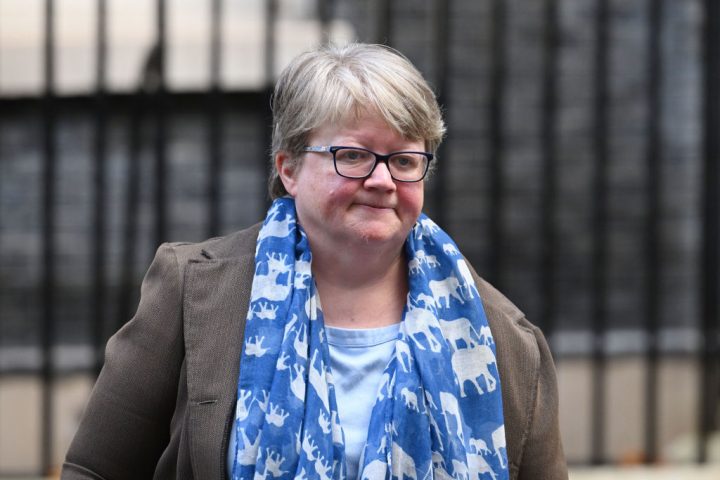Have Conservative ministers lost the battle on sewage? Once again, Tory MPs have been engulfed by a tide of fury from campaigners and constituents who say they’ve ‘voted in favour of dumping sewage’ in rivers and the sea. This is not the first, or indeed the second, time they’ve been on the end of these accusations, and frustration is bubbling over in the party.
I’ve been passed some WhatsApp exchanges in which backbenchers have been kicking up a stink about the way ministers and officials keep failing to roll the pitch on sewage ahead of key votes and debates. The latest row concerns a deferred division on 25 January on water regulations, which set a target for an 80 per cent reduction in phosphates in rivers by 2038, all of which sounds very technical.
The sewage rows are becoming part of the narrative that everything in Britain is broken
Deferred divisions take place without a debate in the Commons, which means they are quick and easily overlooked. However, the way this one was then packaged up by the Liberal Democrats and Labour was that ‘new regulations passed by Conservative MPs will allow water companies to continue dumping sewage into our rivers and seas for another 15 years’. Now that sounds scary – it went viral.
In these WhatsApp messages, MPs rounded on Environment Secretary Therese Coffey to complain about the way they’d been left once again to defend themselves from a deluge of anger from celebrities and opposition MPs on social media. Robert Courts was irritated that something he’d posted back in September at the time of the last sewage row remained true now. He added: ‘We have walked into another social media drive-by on sewage because nobody thought to look for the obvious bear traps in advance, and avoid them.
‘All of these lines, graphics etc could have been commissioned in advance and all backbenchers tee-d up to make the arguments as the vote happened. It’s too late for all that now. The damage is done. Once you are explaining, you have already lost and the superb record that the government has on this now counts, in the public eye, for nothing.’
Jackie Doyle-Price, a former minister, also complained: ‘There is zero horizon-scanning or pitch-rolling and it creates a vacuum for others to set the narrative. This is one that really should have been anticipated.’ Coffey disagreed with her, saying, ‘Not the case JDP. We went through all this first time round during the Envt [Environment] Bill when we said we cannot stop some of these issues straight away. Bill payers cannot afford an £800 uplift on their bills to pay for this to be achieved earlier.’ She also detailed ways in which Defra was rebutting some of the news articles about the sewage problem.
A number of MPs in the group were not impressed, with Robert Courts joining in to suggest they were ‘talking at cross purposes’ because both he and Doyle-Price agreed on the policy points but were concerned about the way this was being communicated (or not communicated, in this case). He later added: ‘It’s about messaging and comms tools ahead in good time. If you want MPs to be able to rebut they deserve to be briefed before Gary Lineker starts attacking them.’
Both Courts and Doyle-Price declined to comment on the messages, but other MPs in the group privately complained to me that they didn’t feel their concerns were being listened to. There was also a spirited conversation between chief whip Simon Hart and environment minister Rebecca Pow on the topic in the voting lobbies on Monday, after an increasing number of MPs went to complain to him about the latest row.
Things seemed to have improved a little yesterday when Coffey gave a statement on the Environment Improvement Plan in the Commons. The government then managed to side-step yet another bear trap (or perhaps manhole, given the topic) tabled by the Lib Dems to the UK Infrastructure Bank Bill which would force water companies to have a ‘costed, time-limited plan’ for preventing sewage discharges into rivers or seas in order to receive investment from the bank. Instead of whipping Tory MPs against the measure, the government decided to accept it, to the great relief of the backbenches.
It’s worth pointing out that these messages were in the ‘Defra support group’ of MPs. I wrote earlier this week about the way these support groups had morphed from tribes of MPs who were keen to defend a minister and advance their cause at every opportunity into forums for asking questions about difficult policies, or indeed complaining.
There was little sense in this discussion that the MPs are all pulling in the same direction. Backbenchers feel that officials and ministers are making their job harder by failing to spot parliamentary pinch points where they can be accused of ‘voting to pump sewage’, while ministers are frustrated by how in thrall to social media some MPs have become, rather than doing their own work and arguing their own case.
On some measures, such as the minimum service legislation for strikes, MPs feel a decent job has been done in preparing the ground for controversial legislation. But despite real efforts to reckon with the water companies for failing to do enough, the sewage rows are becoming part of the narrative that everything in Britain is broken. And that’s why MPs are worried about a problem that’s been going on for years. It is particularly potent right now.







Comments